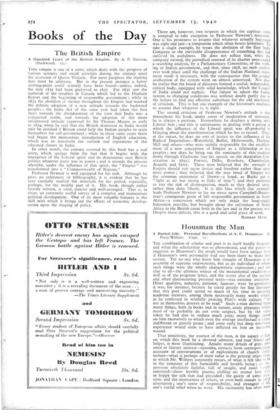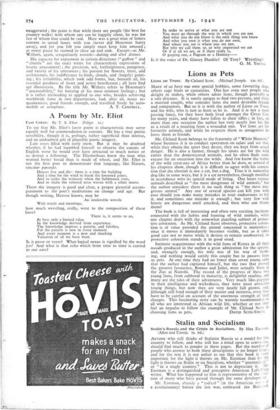Housman the Man
A Buried Life. Personal Recollections of A. E. Housman. By Percy Withers. (Cape. i s .1 THE combination of scholar and poet is in itself hardly frequent. and when the scholarship was so phenomenal, and the poetry so exquisite as Housman's the result would have been unique even if Housman's own personality had not been there to make that certain. Yet no one who knew him thought of Housman as an assembly of supreme endowments, but as an individual of whom such things were the wholly characteristic expression ; and the clue to all—the ultimate source of the monumental erudition a; well as of the poignant lyrics, and the secret also of the curiou, and often disconcerting personal traits—was extreme sensitivity Other qualities, industry, patience, hauteur, were by-products ; it was, for instance, because he cared greatly for fine literature that this poet could spend so much of his time in perusing academic treatises, among them necessarily many works which, as he confessed in wistfully praising Platt's wide culture, "do not in themselves deserve to be read." Such a man derived from many things, both in books and in nature, acute pleasures which most of us probably do not even suspect, but by the same token he had also to endure much pain; many things jarred on him excessively to which even the average intellectual is either indifferent or grossly prone ; and some early but deep emotional experience would seem to have inflicted on him an incurable wound.
That sensitivity, the essence of the man, is the aspect of hint on which this book by a devoted admirer, and true friend and helper, is Most illuminating. Amidst many details of great per- sonal or literary interest—episodes, extracts from correspondence, accounts of conversations or of explorations of church .trclu- tecture—what is perhaps of most value is the general impression, to which Mr. Withers constantly recurs, of what it felt like to be in the company of this formidable and lovable being ; an of some occa: Im- pression absolutely faithful, full of insight, and most conveyed—those terrible pauses, chilling no matter howrich or happy the talk that had preceded ; the gaiety sions and the moroseness of others, or even both moods in raPI4 alternation ; one's sense of responsibility, and strangest 01 au' one's rueful relief when he went. His taciturnity has often been
exaggerated ; the point is that while there are people (the best for country walks) with whom one can be happily silent, he was the last of whom that could be said. Here was a great man of letters content to spend hours with you (never did Housman hurry away), and yet you felt you simply must keep him amused ; at every pause he seemed to close up and sink. Except—as Mr. Withers, again, scrupulously records—during and after dinner.
His capacity for enjoyment in certain directions (" guffaw " and " chortle " are the exact terms for characteristic expressions of hearty amusement) ; the precision, wit, forthrightness, pungency, and variety of his utterances ; his passion for flowers, trees, and architecture, his indifference to birds, clouds, and (largely) paint- ing ; his irritability, which took odd forms, but, beneath all, his essential goodness of heart and active beneficence ; all here find apt illustration. By the title Mr. Withers refers to Housman's " inscrutability," his burying of his most intimate feelings ; but it is rather misleading as applied to one who, besides achieving worldwide fame in two departments, had, after all, many ac- quaintances, good friends enough, and travelled freely by auto-



























 Previous page
Previous page